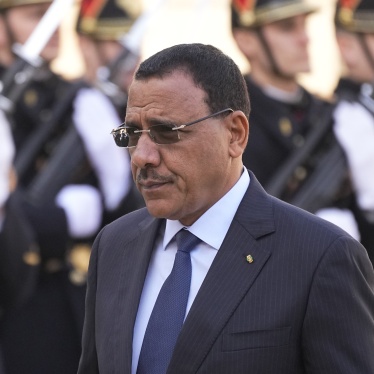(Santiago) — The Chilean Supreme Court should reconsider its decision to end the mandate of the special judges investigating human rights violations committed under the dictatorship of Gen. Augusto Pinochet, a group of leading international human rights organizations said today in an urgent appeal made in support of their Chilean counterparts.
Human Rights Watch, Amnesty International and the International Commission of Jurists said that the Chilean Supreme Court’s termination of the mandate of the special judges, due on July 25, 2005, would be the most serious reverse for justice and accountability for past human rights violations since Chile returned to democratic rule in 1990.
Beginning in 2001, the court had assigned some appellate and first instance judges the task of exclusively or preferentially investigating human rights cases, of which more than 350 are still open.
“In the past four years, these special judges have made more progress on these cases than the whole judiciary did in the previous quarter century,” said José Miguel Vivanco, Americas director at Human Rights Watch. “It would be a tragedy if these advances were halted, just when a spark of hope has reignited for thousands of relatives of Pinochet’s victims.”
The appeal was made at a press conference in Santiago attended by representatives of the Association of Relatives of the Disappeared (AFDD), the Association of Relatives of Victims of Political Execution (AFEP), the Foundation for Social Assistance of the Christian Churches (FASIC), the Corporation for the Promotion and Defense of Peoples’ Rights (CODEPU), the Center for Mental Health and Human Rights (CINTRAS), The Human Rights Program of Diego Portales University, the Chilean section of Amnesty International, and Human Rights Watch.
On January 25, 2005, the Chilean Supreme Court ordered all judges investigating human rights violations under military rule to halt their inquiries within six months. Unless trials are begun within this time, or the parties appeal successfully for cases to be kept open to enable remaining inquiries to be undertaken, all investigations into human rights violations committed during the dictatorship will terminate on July 25, 2005. Moreover, the Supreme Court announced that the mandate of the special judges will come to an end at the same time.
“Whatever the reasons given for this decision, it is a rebuff for judges whose work over the past few years has done much to restore confidence in the rule of law,” said Federico Andreu, Deputy Secretary General on Legal Affairs at the International Commission of Jurists.
The special judges dedicate themselves at present almost entirely to human rights cases and only have to attend regular court sessions twice a week. On July 25, 2005, they would have to return to their customary court duties. They would no longer have access to contracted experts, secretarial help, computer support, travel expenses and the assistance of clerks currently assigned to aid them on human rights cases.
The Association of Relatives of the Disappeared is asking for the appointment of more special judges, with additional staff, technical and economic resources and increased support for Department 5 of the criminal investigations police.
Lawyers representing relatives of victims consider that these special resources and the skills of Department 5 (a unit of the criminal investigations police that has specialized in human rights cases) have been decisive in the recent judicial advances in human rights cases.
“The easiest way to address this problem would be for the Supreme Court to reconsider its decision to end the term of the special judges and ensure that human rights investigations and trials are properly resourced in the future,” said Susan Lee, Americas director at Amnesty International.
On Monday, the Santiago Appeal Court meets to consider the formal petition eight appellate judges made on March 11, 2005 asking the court to urge the Supreme Court to allow them to keep their present work load and resources. The judges stressed that it would be impossible otherwise to continue advancing the cases.
“If our appeal to the judiciary is unsuccessful, we will urge Congress to support legislation to continue the work of the special judges,” said Lorena Pizarro, president of the Association of Relatives of the Disappeared. “We will suggest ways that our demand could be met by amending legislation already under debate in Congress.”
The Supreme Court resolution will affect hundreds of cases now under investigation by the courts. They include a probe by Judge Alejandro Solis into “disappearances” and torture in the Villa Grimaldi, a clandestine detention center in Santiago used by Pinochet’s secret police in the 1970s. The fate of more than 100 victims is still unknown. The investigation conducted by Judge Solis into the 1974 car-bomb murder in Buenos Aires of General Carlos Prats, who preceded Pinochet as army commander, could also be cut short.
Another judge, Jorge Zepeda, is currently probing “disappearances” and torture in the Colonia Dignidad, an estate belonging to a secretive German sect in southern Chile that was used as a base by the secret police after the military coup in 1973. Following the capture of the sect’s leader, Paul Schaefer, in Buenos Aires in March, investigators discovered the engines of two Renaults buried on the property, which are believed to have belonged to victims abducted by Pinochet’s security forces. Dozens of other victims are known to have been held at the colony in the 1970s and 1980s, but their fate is unknown.
Police inquiries into the death of former President Eduardo Frei Montalva while hospitalized in a Santiago clinic in 1982 have reinforced suspicions that Frei died from a toxin administered by government agents. What really happened to Frei may never been known unless the investigating judge, Alejandro Madrid, is given the time and resources to continue his investigation.







